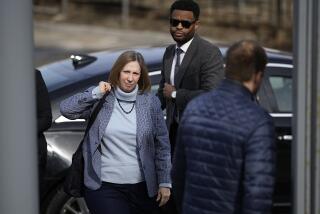Judge Orders Spy Suspect Held; Russia Assails Tunnel ‘Violation’
- Share via
WASHINGTON — A federal judge ruled Monday that “extraordinarily strong” evidence against accused spy Robert Philip Hanssen warrants keeping him behind bars for now, as Russian diplomats demanded information about a secret eavesdropping tunnel that may be linked to the former FBI agent.
Russian officials said reports that the United States built the spy tunnel underneath the Soviet Embassy in Washington beginning in the 1970s, if true, reveal “a flagrant violation” of international law. The White House, while refusing to confirm or deny the existence of the tunnel, said Monday that it does not expect the diplomatic flare-up to hurt the Bush administration’s fledgling relations with Moscow.
“I think that the president is still going to approach relations with Moscow the same way he always has,” White House spokesman Ari Fleischer told reporters. “We’re looking forward to having good relations with Russia, straightforward and direct conversations, which is the president’s manner and style.”
The episode was triggered by a report in Sunday’s New York Times disclosing that the United States spent several hundred million dollars in the 1970s and 1980s building an eavesdropping tunnel under the then-Soviet Embassy in Washington. Hanssen may have betrayed the joint FBI-National Security Agency operation to his Russian handlers, the newspaper said.
Intelligence sources Monday confirmed the existence of the tunnel but cautioned that it is unclear how much secret information it ever generated or exactly what role Hanssen may have played in tipping off Moscow to the fact that it had been built.
Hanssen’s defense attorney, Plato Cacheris, also warned the public to be “skeptical” about what he characterized as speculative reports on the tunnel and Hanssen’s connection to it.
“No one [in the government] has accused Mr. Hanssen of disclosing the existence of this tunnel, if there ever was a tunnel,” Cacheris said in his first public remarks on the 2-week-old spying scandal.
Cacheris spoke prior to a brief appearance by his client Monday in U.S. District Court in Alexandria, Va., on the government’s motion to keep Hanssen locked up.
Cacheris did not object, and Hanssen, wearing a green prison jumpsuit, answered “I do, your honor” when U.S. Magistrate Judge Theresa Buchanan asked whether he understood that he was giving up his right to oppose the detention.
The former FBI counterintelligence agent, responsible for catching Russian spies, is accused of selling top-secret data to Russia over a period of 15 years in exchange for $1.4 million in cash and diamonds. Facing a possible death sentence, he plans to plead not guilty.
Assistant U.S. Atty. Randy Bellows told the magistrate that Hanssen, if freed, could try to flee the country and that he poses “an exceptionally grave danger” to U.S. national security because he had access to such sensitive information at the FBI. Buchanan agreed, noting that Hanssen had his passport when he was arrested Feb. 18.
Buchanan, ordering Hanssen’s continued confinement, called the case against the 25-year FBI agent “extraordinarily strong.”
Meanwhile, in Moscow on Monday, the Russian Foreign Ministry called in the U.S. charge d’affaires, George Krol, demanding information about the Russian Embassy tunnel. U.S. officials said the request was forwarded to Washington.
Russian Foreign Intelligence Service press spokeswoman Tatyana Samolis said if the reports of the tunnel prove true, it was a flagrant violation of international law.
Retired KGB Col. Igor Prelin said in an interview that he learned of the existence of the tunnel about a decade ago.
“I will tell you more, and it is obvious now, thanks to our sources in special services who informed us, we knew everything about the tunnel,” Prelin claimed. He said the Russians had cut the listening cables in the early 1990s.
*
Lichtblau reported from Washington and Dixon from Moscow.
More to Read
Sign up for Essential California
The most important California stories and recommendations in your inbox every morning.
You may occasionally receive promotional content from the Los Angeles Times.













